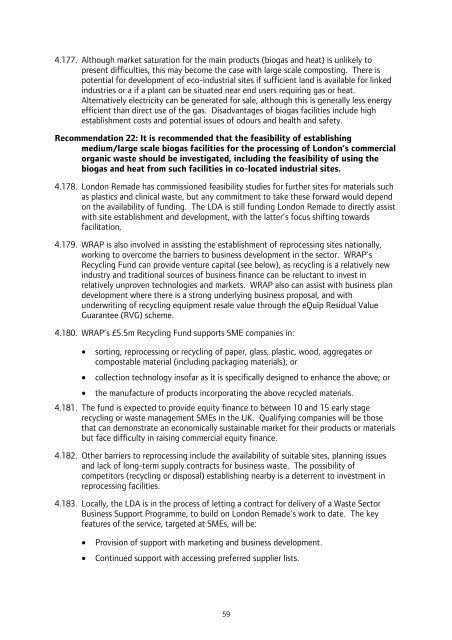London Wider Waste Strategy - London - Greater London Authority
London Wider Waste Strategy - London - Greater London Authority
London Wider Waste Strategy - London - Greater London Authority
Create successful ePaper yourself
Turn your PDF publications into a flip-book with our unique Google optimized e-Paper software.
4.177. Although market saturation for the main products (biogas and heat) is unlikely to<br />
present difficulties, this may become the case with large scale composting. There is<br />
potential for development of eco-industrial sites if sufficient land is available for linked<br />
industries or a if a plant can be situated near end users requiring gas or heat.<br />
Alternatively electricity can be generated for sale, although this is generally less energy<br />
efficient than direct use of the gas. Disadvantages of biogas facilities include high<br />
establishment costs and potential issues of odours and health and safety.<br />
Recommendation 22: It is recommended that the feasibility of establishing<br />
medium/large scale biogas facilities for the processing of <strong>London</strong>’s commercial<br />
organic waste should be investigated, including the feasibility of using the<br />
biogas and heat from such facilities in co-located industrial sites.<br />
4.178. <strong>London</strong> Remade has commissioned feasibility studies for further sites for materials such<br />
as plastics and clinical waste, but any commitment to take these forward would depend<br />
on the availability of funding. The LDA is still funding <strong>London</strong> Remade to directly assist<br />
with site establishment and development, with the latter’s focus shifting towards<br />
facilitation.<br />
4.179. WRAP is also involved in assisting the establishment of reprocessing sites nationally,<br />
working to overcome the barriers to business development in the sector. WRAP’s<br />
Recycling Fund can provide venture capital (see below), as recycling is a relatively new<br />
industry and traditional sources of business finance can be reluctant to invest in<br />
relatively unproven technologies and markets. WRAP also can assist with business plan<br />
development where there is a strong underlying business proposal, and with<br />
underwriting of recycling equipment resale value through the eQuip Residual Value<br />
Guarantee (RVG) scheme.<br />
4.180. WRAP’s £5.5m Recycling Fund supports SME companies in:<br />
• sorting, reprocessing or recycling of paper, glass, plastic, wood, aggregates or<br />
compostable material (including packaging materials); or<br />
• collection technology insofar as it is specifically designed to enhance the above; or<br />
• the manufacture of products incorporating the above recycled materials.<br />
4.181. The fund is expected to provide equity finance to between 10 and 15 early stage<br />
recycling or waste management SMEs in the UK. Qualifying companies will be those<br />
that can demonstrate an economically sustainable market for their products or materials<br />
but face difficulty in raising commercial equity finance.<br />
4.182. Other barriers to reprocessing include the availability of suitable sites, planning issues<br />
and lack of long-term supply contracts for business waste. The possibility of<br />
competitors (recycling or disposal) establishing nearby is a deterrent to investment in<br />
reprocessing facilities.<br />
4.183. Locally, the LDA is in the process of letting a contract for delivery of a <strong>Waste</strong> Sector<br />
Business Support Programme, to build on <strong>London</strong> Remade’s work to date. The key<br />
features of the service, targeted at SMEs, will be:<br />
• Provision of support with marketing and business development.<br />
• Continued support with accessing preferred supplier lists.<br />
59
















